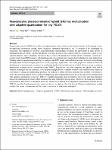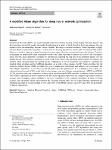Search
Author
- Amany M., Sarhan (1)
- Chong, Li (1)
- Haoran, Wang (1)
- M., Arafa (1)
- next >
Subject
- DNN designers (1)
- DNNs’ superpower (1)
- HN Adam (1)
Date issued
Has File(s)
- true (3)
Search Results
The increasing size of deep neural networks (DNNs) raises a high demand for distributed training. An expert could find good hybrid parallelism strategies, but designing suitable strategies is time and labor-consuming. Therefore, automating parallelism strategy generation is crucial and desirable for DNN designers. Some automatic searching approaches have recently been studied to free the experts from the heavy parallel strategy conception. However, these approaches all rely on a numerical cost model, which requires heavy profiling results that lack portability. These profiling-based approaches cannot lighten the strategy generation work due to the non-reusable profiling value. Our intuition is that there is no need to estimate the actual execution time of the distributed training bu... |
Deep neural networks (DNNs) have delivered unprecedented achievements in the modern Internet of Everything society, encompassing autonomous driving, expert diagnosis, unmanned supermarkets, etc. It continues to be challenging for researchers and engineers to develop a high-performance neuromorphic processor for deployment in edge devices or embedded hardware. DNNs’ superpower derives from their enormous and complex network architecture, which is computation-intensive, time-consuming, and energy-heavy. Due to the limited perceptual capacity of humans, accurate processing results from DNNs require a substantial amount of computing time, making them redundant in some applications. Utilizing adaptive quantization technology to compress the DNN model with sufficient accuracy is crucial f... |
Deep Neural Networks (DNNs) are widely regarded as the most effective learning tool for dealing with large datasets, and they have been successfully used in thousands of applications in a variety of fields. Based on these large datasets, they are trained to learn the relationships between various variables. The adaptive moment estimation (Adam) algorithm, a highly efficient adaptive optimization algorithm, is widely used as a learning algorithm in various fields for training DNN models. However, it needs to improve its generalization performance, especially when training with large-scale datasets. Therefore, in this paper, we propose HN Adam, a modified version of the Adam Algorithm, to improve its accuracy and convergence speed. The HN_Adam algorithm is modified by automatically ad... |



